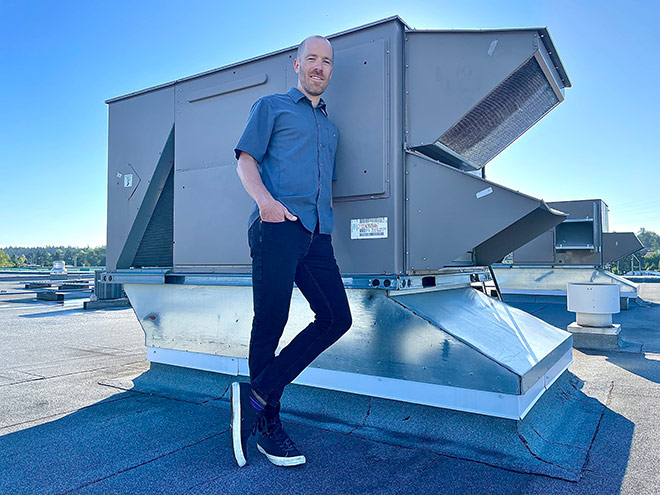Inside Island Health's long-term efficiency plan

On track for 2030 GHG reductions targets
Island Health is responsible for delivering health and care services to approximately 900,000 people in and around Vancouver Island. Their facilities maintenance and operations department manages approximately 5,500,000 ft2 of owned healthcare facilities and approximately 130 leased facilities. Offering a complete range of health services, the organization provides public health support, primary healthcare, home and community care, mental health and substance use services, as well as acute care in hospitals.
Like most B.C. public service organizations, Island Health is committed to a 50% reduction in greenhouse gas (GHG) emissions by 2030, and an 80% reduction by 2050.
BAS specialists, drivers in energy-savings
Justin Blanchfield is playing an instrumental role in supporting these ambitious goals as Island Health's Building Automation Systems (BAS) specialist. If an energy manager is responsible for selecting and integrating more energy-efficient equipment, then a BAS specialist is focused on optimizing equipment performance.
"I'm fortunate to be part of an incredible energy team consisting of commercial energy managers, energy specialists and data analysts. I help them to identify and implement low-cost energy saving measures by leveraging our building automation systems," Justin explains. "This includes simple strategies like turning heating boilers off in the summer or modifying temperature setpoints and airflow rates based on demand. My goal in this role was to prove that organizations can run much more successful building optimization programs by internalizing this function rather than relying on external consultants. I knew enough about healthcare to be intimidated by the complexity of the buildings. But when you do nothing but optimize healthcare facilities every day, you get really good at it!" he continues.
During his tenure, Justin has had to reconcile several challenges unique to the healthcare industry, including diverse space usage and building types. "Every space – such as isolation rooms, emergency rooms or operating rooms – has its own set of standards for ventilation, temperature and pressurization," he explains. "And since regional hospitals grow organically over time, you can have one facility made up of different structures and HVAC equipment from the '40s, '60s, '80s and '90s. This makes the HVAC systems very complex and challenging to optimize."
Despite the obstacles, Justin has witnessed positive results from his initiatives to date, which he attributes to Island Health's passionate commitment to GHG reduction. "We have incredible support from our leadership. We want to lead the charge and show other organizations in Canada that it's possible to achieve their 2030 emissions targets."
With support from BC Hydro, the team is also busy developing energy efficiency roadmaps for each building, which includes exploring the different ways Island Health can get to where they need to be by 2050. "This level of planning helps to ensure that every single capital upgrade fits into that master plan," says Justin.
This can mean making choices that seem counter-intuitive in the short term, but will pay off further down the road. "If HVAC equipment fails, it's common to replace it with a like-for-like solution. This means committing to current inefficient technology that will harm efficiency efforts in the future. We recently had a large chiller that needed replacing. By engaging with onsite operations staff and roadmapping a solution with leadership, we got approval to install a heat recovery chiller. While we don't yet have a firmed-up design for where to send the recovered heat, we do know that maximizing heat recovery is critical for achieving our GHG emissions targets."
A very successful start
Over the last two years, Island Health's commitment to sustainability combined with Justin's efforts have led to results that have exceeded expectations, including the following impressive energy savings:
| Building | Annual electricity savings | Annual gas savings |
|---|---|---|
| Long term care (large) | 23% | 39% |
| Long term care (small) | 18% | 41% |
| Acute care hospital | 21% | 29% |
| Office | 30% | 83% |
Justin has also been working on a number of portfolio-wide optimization opportunities, including:
- Developing a BAS Design Guideline to support BAS upgrades
- Embracing fault detection and analytics software
- Improving scoping and planning of capital projects
- Upgrading networks to enable the transition to smart building technology
As impressive as these results are, Justin knows they're just the beginning. "Continuous optimization means we're constantly looking to improve on these results. I really encourage other organizations to build their internal engineering capacity for energy auditing and optimization. It requires significant expertise, strong relationships, consistent effort and time. Growing this technical capacity in-house is a great step towards hitting your 2030 GHG emissions targets. It also leads to significant reductions in operating costs and comfort complaints. It's a win-win-win situation!"
Is a BAS specialist or Energy Manager right for you?
To find out more about our BAS specialists or Commercial Energy Manager programs, contact your Key Account Manager or Regional Energy Manager, or call 604 522 4713 in the Lower Mainland or 1 866 522 4713 elsewhere in B.C.